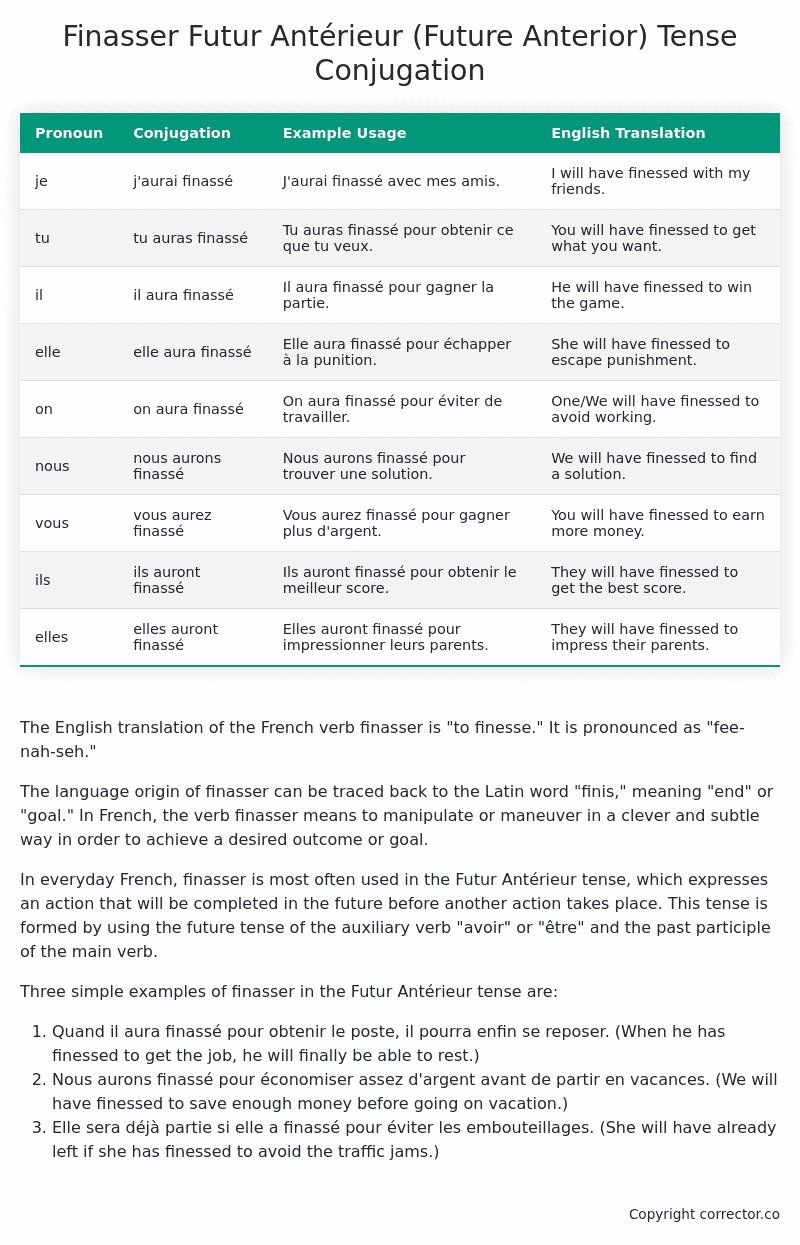Futur Antérieur (Future Anterior) Tense Conjugation of the French Verb finasser
Introduction to the verb finasser
The English translation of the French verb finasser is “to finesse.” It is pronounced as “fee-nah-seh.”
The language origin of finasser can be traced back to the Latin word “finis,” meaning “end” or “goal.” In French, the verb finasser means to manipulate or maneuver in a clever and subtle way in order to achieve a desired outcome or goal.
In everyday French, finasser is most often used in the Futur Antérieur tense, which expresses an action that will be completed in the future before another action takes place. This tense is formed by using the future tense of the auxiliary verb “avoir” or “être” and the past participle of the main verb.
Three simple examples of finasser in the Futur Antérieur tense are:
- Quand il aura finassé pour obtenir le poste, il pourra enfin se reposer. (When he has finessed to get the job, he will finally be able to rest.)
- Nous aurons finassé pour économiser assez d’argent avant de partir en vacances. (We will have finessed to save enough money before going on vacation.)
- Elle sera déjà partie si elle a finassé pour éviter les embouteillages. (She will have already left if she has finessed to avoid the traffic jams.)
Table of the Futur Antérieur (Future Anterior) Tense Conjugation of finasser
| Pronoun | Conjugation | Example Usage | English Translation |
|---|---|---|---|
| je | j’aurai finassé | J’aurai finassé avec mes amis. | I will have finessed with my friends. |
| tu | tu auras finassé | Tu auras finassé pour obtenir ce que tu veux. | You will have finessed to get what you want. |
| il | il aura finassé | Il aura finassé pour gagner la partie. | He will have finessed to win the game. |
| elle | elle aura finassé | Elle aura finassé pour échapper à la punition. | She will have finessed to escape punishment. |
| on | on aura finassé | On aura finassé pour éviter de travailler. | One/We will have finessed to avoid working. |
| nous | nous aurons finassé | Nous aurons finassé pour trouver une solution. | We will have finessed to find a solution. |
| vous | vous aurez finassé | Vous aurez finassé pour gagner plus d’argent. | You will have finessed to earn more money. |
| ils | ils auront finassé | Ils auront finassé pour obtenir le meilleur score. | They will have finessed to get the best score. |
| elles | elles auront finassé | Elles auront finassé pour impressionner leurs parents. | They will have finessed to impress their parents. |
Other Conjugations for Finasser.
Le Present (Present Tense) Conjugation of the French Verb finasser
Imparfait (Imperfect) Tense Conjugation of the French Verb finasser
Passé Simple (Simple Past) Tense Conjugation of the French Verb finasser
Passé Composé (Present Perfect) Tense Conjugation of the French Verb finasser
Futur Simple (Simple Future) Tense Conjugation of the French Verb finasser
Futur Proche (Near Future) Tense Conjugation of the French Verb finasser
Plus-que-parfait (Pluperfect) Tense Conjugation of the French Verb finasser
Passé Antérieur (Past Anterior) Tense Conjugation of the French Verb finasser
Futur Antérieur (Future Anterior) Tense Conjugation of the French Verb finasser (this article)
Subjonctif Présent (Subjunctive Present) Tense Conjugation of the French Verb finasser
Subjonctif Passé (Subjunctive Past) Tense Conjugation of the French Verb finasser
Subjonctif Imparfait (Subjunctive Imperfect) Tense Conjugation of the French Verb finasser
Subjonctif Plus-que-parfait (Subjunctive Pluperfect) Tense Conjugation of the French Verb finasser
Conditionnel Présent (Conditional Present) Tense Conjugation of the French Verb finasser
Conditionnel Passé (Conditional Past) Tense Conjugation of the French Verb finasser
L’impératif Présent (Imperative Present) Tense Conjugation of the French Verb finasser
L’infinitif Présent (Infinitive Present) Tense Conjugation of the French Verb finasser
Struggling with French verbs or the language in general? Why not use our free French Grammar Checker – no registration required!
Get a FREE Download Study Sheet of this Conjugation 🔥
Simply right click the image below, click “save image” and get your free reference for the finasser Futur Antérieur tense conjugation!

Finasser – About the French Futur Antérieur (Future Anterior) Tense
Construction
Common Everyday Usage Patterns
Interactions with Other Tenses
For example
Summary
I hope you enjoyed this article on the verb finasser. Still in a learning mood? Check out another TOTALLY random French verb conjugation!


